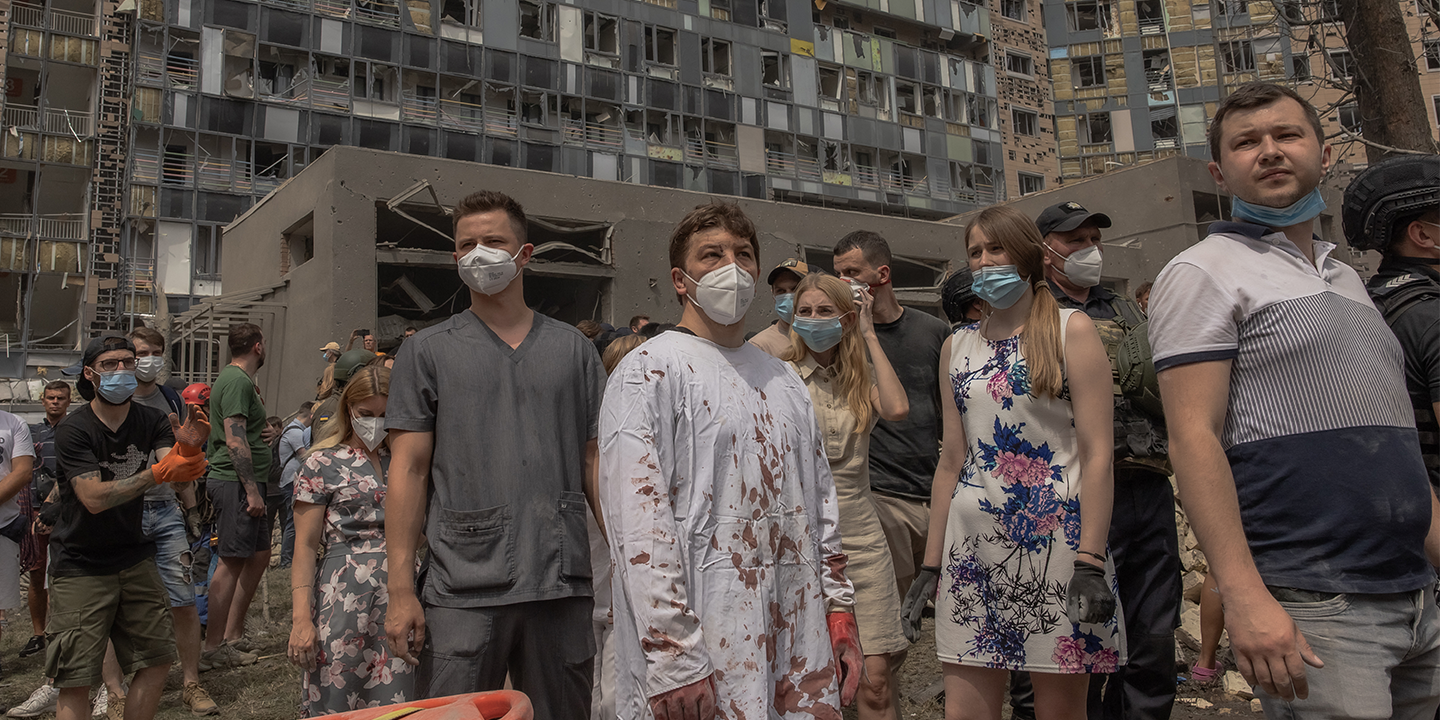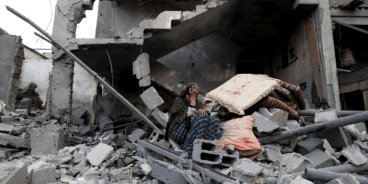

Atrocity Alert No. 402: Ukraine, Myanmar (Burma) and Nigeria
Atrocity Alert is a weekly publication by the Global Centre for the Responsibility to Protect highlighting situations where populations are at risk of, or are enduring, mass atrocity crimes.
RUSSIAN FORCES KILL 41 IN DAYTIME STRIKES ACROSS UKRAINE
On 8 July Russian forces launched over 40 missiles at cities across Ukraine, killing at least 41 civilians. At least 33 people were killed in Kyiv alone, including two who were killed at the Ohmatdyt Children’s Hospital. During a UN Security Council (UNSC) emergency meeting on the attacks on 9 July, Volodymyr Zhovnir, a cardiac surgeon and anaesthesiologist at the hospital, said, “At 10:42 AM we felt a powerful explosion, the ground shook and the walls trembled, both children and adults screamed and cried from fear and wounded from pain…it was a real hell,” highlighting that striking a hospital where children are receiving care for cancer and life-threatening diseases “is not just a war crime, it is far beyond the limit of humanity.” Ukraine’s President, Volodymyr Zelensky, said that the attacks destroyed nearly 100 buildings, including residential houses, a business center and two medical facilities, were damaged in the attacks which are now one of the largest since the full-scale invasion began in February 2022. Ukrainian strikes in the early hours of 9 July also killed four people in the Russian border region of Belgorod.
These attacks are yet another example of a devastating trend of increasing civilian casualties in recent months. On 3 July the UN Human Rights Monitoring Mission on Ukraine (HRMMU) released a report highlighting the impact of the conflict on civilians. The report states that between 1 March to 31 May 2024 at least 436 people were killed due to conflict-related violence in Ukraine. The report also notes that Russian authorities reported at least 91 civilian were killed in Russia due to Ukrainian attacks during the reporting period, although the UN has not been able to verify the casualty figures. The head of the HRMMU, Danielle Bell, said, “With May having the highest monthly number of civilian casualties in nearly a year, fighting this spring took a horrific toll on civilians, particularly in Kharkiv region and city.”
One of the main reasons for such high levels of civilian harm, according to the HRMMU, was the use of large, air-dropped bombs and missiles in populated areas and at least five instances of “double-tap” attacks, which caused numerous casualties among first responders.
During the UNSC meeting on 9 July, Joyce Msuya, Acting Under-Secretary-General for Humanitarian Affairs and Emergency Relief Coordinator, said, “hospitals have special protections under international law. Attacking a protected hospital is a war crime and perpetrators must be held to account…these attacks are part of a deeply alarming pattern of systemic attacks harming healthcare and other civilian infrastructure across Ukraine.”
The conflict shows no signs of abating and more must be done to mitigate civilian harm in Ukraine and Russia. States should continue to support Ukraine as it works to protect its populations, including through bolstering its air defense capabilities to intercept more missiles dropped on civilians across the country. The international community should continue to support accountability measures for crimes committed against civilians.
UN EXPERT WARNS OF “ECHOES” OF “GENOCIDAL VIOLENCE” IN MYANMAR
On 3 July the UN Special Rapporteur on the situation of human rights in Myanmar, Tom Andrews, spoke at the 56th session of the UN Human Rights Council in Geneva, warning about ongoing abuses that may amount to war crimes and crimes against humanity. During the briefing, Special Rapporteur Andrews introduced a conference room paper that found that the junta has “launched a systematic campaign to attack women human rights defenders and to dismantle the organizations and networks that support women, girls, and LGBT people.” According to the paper, women, girls and members of the LGBTQIA+ community have endured widespread rape and sexual violence.
The paper also asserted that the situation is particularly grim in Rakhine State where the minority Muslim Rohingya population have faced persecution for decades and are currently caught in fighting between the Arakan Army and the junta. Special Rapporteur Andrews said, “For Rohingya people—oppressed, scapegoated, exploited, and stuck between warring parties—the situation carries echoes of the lead-up to genocidal violence in 2016 and 2017,” while highlighting how the junta has deliberately stoked tensions between the Rakhine and Rohingya communities.
These updates further confirm how civilians continue to bear the brunt of the ongoing conflict between the junta and various ethnic resistance organizations. After a ceasefire broke down, fighting resumed in Shan State on 25 June. The Ta’ang National Liberation Army has targeted the junta-controlled regional capital of Lashio, where at least 15 civilians have been killed since 3 July and 50,000 displaced in fighting in the area. Clashes have also continued to escalate with civilian casualties in Chin, Magway, Mandalay, Sagaing and Kayah states and Bago and Tanintharyi regions. The fighting has killed over 5,200 civilians since March 2021, displaced almost 3.1 million people and left 18.6 million people in need of urgent humanitarian assistance.
During the session Special Rapporteur Andrews issued a second conference room paper that reported on dozens of banks and financial institutions in seven countries – Thailand, Singapore, Malaysia, Russia, India, China and the Republic of Korea – that have facilitated junta transactions of weapons, dual-use technologies, manufacturing equipment and more. Thailand has now become a leading source of military supplies purchased through the international system, with companies in Thailand doubling their sales to the junta to almost $130 million dollars from 2022-2023.
The international community must continue to implement sanctions targeted at cutting off the junta’s access to the cash, aviation fuel, weapons and legitimacy they need to continue carrying atrocities against civilians. States should add the Myanma Economic Bank and other financial institutions, to sanctions lists expeditiously. Additionally, sanctions should be levied against actors in Myanmar’s aviation fuel supply chain to ground the planes that continue to conduct strikes on civilians.
COORDINATED SUICIDE BOMBINGS KILL CIVILIANS IN BORNO STATE, NIGERIA
On Saturday, 29 June, a series of suicide bombing attacks in the town of Gwoza, in Nigeria’s northeastern Borno State, resulted in at least 32 deaths and more than 100 injuries. The first of the three coordinated suicide bombings targeted a well-attended wedding reception, the second was detonated at a funeral and the third at a hospital. Although no group has claimed responsibility for the latest attack, the operational tactics, including the use of female suicide bombers, suggests the involvement of the armed extremist group Boko Haram.
Boko Haram has a history of perpetrating abuses targeting women and girls, including kidnapping hundreds of students from schools for girls in the past decade. Sometimes the abducted women and girls are subsequently utilized in suicide bombings, raising fears that the female suicide bombers in Gwoza may have been among those kidnapped by the group. A 2017 study by the Combating Terrorism Center revealed that 56 percent of Boko Haram’s suicide bombing attacks were female bombers.
The attacks occurred just two days after government officials announced success in their so-called war against extremists. Originating in the early 2000s in the northeast, Boko Haram sought to overthrow Nigeria’s secular government and in 2009 it launched an insurgency to establish an Islamic state, resulting in at least 35,000 deaths and the displacement of over 2 million people in Nigeria, as well as attacks in neighboring countries in the Lake Chad Basin. Although the group has perpetrated attacks sporadically in recent years, they remain a threat to civilians in the region. The resurgence of suicide bombings in Borno State has raised significant concerns about the security situation in the region. Nigeria’s armed forces have been deployed in two-thirds of the states in the country and are overstretched as Boko Haram, other armed extremist groups and bandit groups continue to expand their areas of operation.
Jaclyn Streitfeld-Hall, Director of Policy and Research at the Global Centre for the Responsibility to Protect, noted that, “While the lack of adequate military protection for vulnerable populations needs urgent attention, military means alone are unlikely to defeat the groups. Addressing the root causes of conflict—such as poor governance, corruption, poverty, youth unemployment, environmental degradation, and climate change—through social initiatives and political reforms remains crucial.” Importantly, improved service delivery could curb the drivers of recruitment in neglected rural areas, providing vulnerable populations with more responsive civilian administration and military protection. Reintegration programs for those who defect from armed and bandit groups should be strengthened while holding them accountable for their crimes. The Lake Chad Basin governments, including the Nigerian government, should continue to contain the militants’ advances and explore non-military avenues of engaging with militant factions.
Related Content


Atrocity Alert No. 431: Israel and the Occupied Palestinian Territory, Burkina Faso and Sudan
